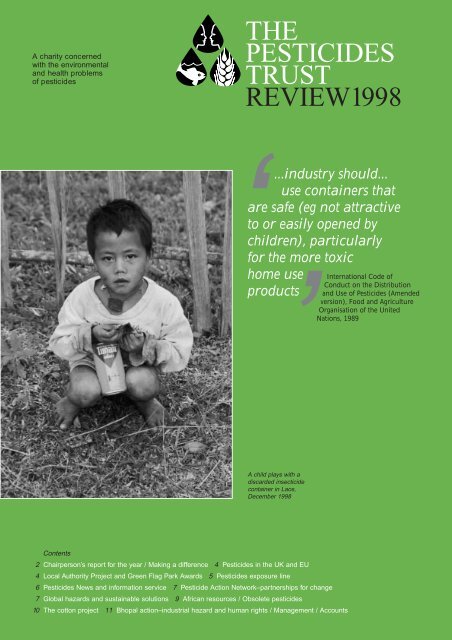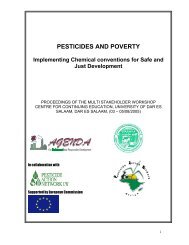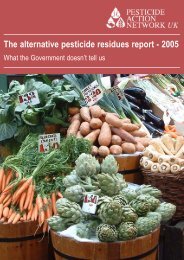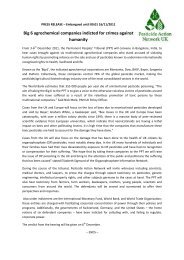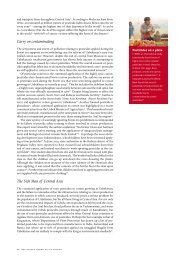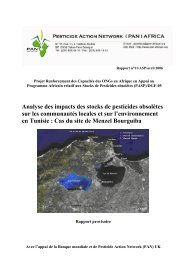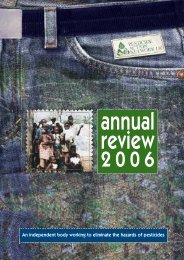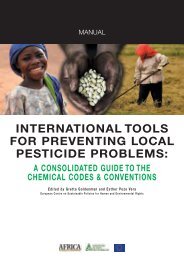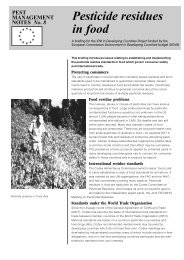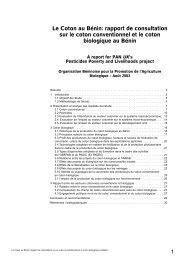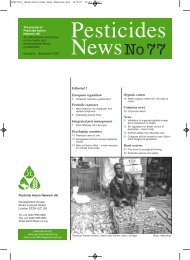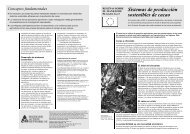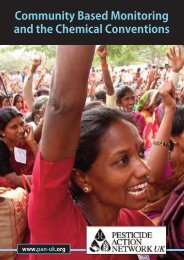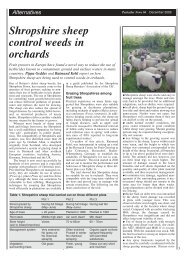PDF 313 KB - Pesticide Action Network UK
PDF 313 KB - Pesticide Action Network UK
PDF 313 KB - Pesticide Action Network UK
You also want an ePaper? Increase the reach of your titles
YUMPU automatically turns print PDFs into web optimized ePapers that Google loves.
A charity concerned<br />
with the environmental<br />
and health problems<br />
of pesticides<br />
THE<br />
PESTICIDES<br />
TRUST<br />
REVIEW1998<br />
...industry should...<br />
use containers that<br />
are safe (eg not attractive<br />
to or easily opened by<br />
children), particularly<br />
for the more toxic<br />
home use<br />
‘products<br />
International Code of<br />
Conduct on the Distribution<br />
and Use of <strong>Pesticide</strong>s (Amended<br />
version), Food and Agriculture<br />
Organisation of the United<br />
’Nations, 1989<br />
A child plays with a<br />
discarded insecticide<br />
container in Laos,<br />
December 1998<br />
1 Contents<br />
12 Chairperson’s report for the year / Making a difference 4 <strong>Pesticide</strong>s in the <strong>UK</strong> and EU<br />
14 Local Authority Project and Green Flag Park Awards 5 <strong>Pesticide</strong>s exposure line<br />
16 <strong>Pesticide</strong>s News and information service 7 <strong>Pesticide</strong> <strong>Action</strong> <strong>Network</strong>–partnerships for change<br />
17 Global hazards and sustainable solutions 9 African resources / Obsolete pesticides<br />
10 The cotton project 11 Bhopal action–industrial hazard and human rights / Management / Accounts
THE PESTICIDES TRUST<br />
Chairperson’s Report<br />
for 1998<br />
Making a difference<br />
The past year has brought significant developments in<br />
the struggle to control hazardous chemicals and the<br />
excesses of free trade.<br />
The Rotterdam Convention made the Prior Informed<br />
Consent process (PIC) legally binding, giving governments<br />
the right to ensure hazardous chemicals are not<br />
imported into their country and requiring exporters not<br />
to export them. Negotiations began for a Convention to<br />
phase out Persistent Organic Pollutants (POPs) – many<br />
of which are pesticides.<br />
The Organisation for Economic Cooperation and<br />
Development (OECD) and the UN Food and Agriculture<br />
Organisation (FAO) established links to promote a new<br />
vision of Integrated Pest Management (IPM) between<br />
countries of the North and South – FAO has already pioneered<br />
farmer participatory ecological IPM through<br />
farmer field schools.<br />
Environmental, consumer, health, farming and development<br />
groups challenged patenting and called for international<br />
regulation under the Convention on Biodiversity<br />
to keep open access to life forms.<br />
In Europe, including the <strong>UK</strong>, there was major concern<br />
about genetically engineered crops, their impacts, the<br />
lack of consumer choice and the dictation of the agricultural<br />
agenda by corporations.<br />
In the <strong>UK</strong>, the long term health effects of particular<br />
pesticides was at last recognised by the joint report<br />
Organophosphate sheep dip from the Royal College of<br />
Physicians and the Royal College of Psychiatrists. The<br />
Joint Nature Conservation Committee highlighted the<br />
accumulated research evidence of dramatic declines in<br />
farmland birds mainly attributed to the indirect impacts<br />
of pesticides. A significant and welcome development<br />
in the <strong>UK</strong>, partly resulting from concerns over pesticides,<br />
health and genetically engineered crops, has<br />
been a dramatic increase in organic food sales and<br />
farm conversion.<br />
We in the <strong>Pesticide</strong>s Trust with others now have the<br />
chance within reform of the Common Agricultural Policy<br />
(CAP), trade negotiations, and advice and aid packages<br />
to press for genuine ecological agriculture and<br />
organic production. There have been positive steps to<br />
eliminating the hazards of pesticides during<br />
1998, but there is still a great deal to do.<br />
Joy Greenall Earthcare Consultancy<br />
The <strong>Pesticide</strong>s Trust promotes healthy food,<br />
agriculture and a sustainable, safe environment<br />
to provide food and meet public health<br />
needs without dependence on toxic chemicals.<br />
We work for the elimination of pesticide<br />
hazards, and promote policies and practices<br />
which minimise exposure of workers, consumers<br />
and communities to pesticides. The<br />
sustainable alternatives we propose are based<br />
on farmer and community participation and on<br />
knowledge of ecological agriculture. The aim is<br />
to grow safe and nutritious food, and support<br />
farming and rural communities to become<br />
independent of the pesticide treadmill. The<br />
<strong>Pesticide</strong>s Trust is an independent charity. We<br />
work nationally and internationally with likeminded<br />
groups and individuals concerned with<br />
health, environment and development to:<br />
● Eliminate the hazards of pesticides<br />
● Reduce dependence on pesticides<br />
● Promote sustainable and ecological<br />
alternatives to chemical pest control<br />
Strategies for change<br />
Information<br />
In our journal, <strong>Pesticide</strong>s News, and in briefing<br />
papers, reports and books we publish unique<br />
and independent information on pesticides.<br />
Users of these resources include governments<br />
and decision-makers, researchers, farmers,<br />
trade unions, public interest groups, those<br />
affected by pesticides, the media, academics,<br />
educational bodies and the general public.<br />
Support for field work<br />
In partnership with public interest groups in<br />
developing countries, the Trust supports pilot<br />
projects to demonstrate the viability of<br />
conversion to organic systems as a means of<br />
providing farmers with economically viable,<br />
socially acceptable and environmentally sound<br />
livelihoods.<br />
<strong>Network</strong>ing and capacity building<br />
The Trust is part of a world-wide coalition, the<br />
<strong>Pesticide</strong> <strong>Action</strong> <strong>Network</strong> (PAN). We work<br />
closely with PAN partners on joint projects<br />
and develop capacity to participate effectively<br />
in national and international initiatives which<br />
strengthen pesticide controls and promote<br />
sustainable alternatives.<br />
2
Peter Beaumont<br />
Development<br />
Director<br />
Barbara Dinham<br />
Programme<br />
Director<br />
David Buffin Mark Davis<br />
Editor, <strong>Pesticide</strong>s Project<br />
News and Current Coordinator<br />
Research Monitor<br />
Dorothy Myers<br />
Cotton Project<br />
Coordinator<br />
Alison Craig<br />
<strong>Pesticide</strong><br />
Exposure<br />
Support Line<br />
David Allen<br />
Office Manager<br />
Ethan Irungu<br />
Finance Officer<br />
Research<br />
Understanding the cause and effect of pesticide<br />
problems on men and women and on the<br />
environment is a prerequisite for reducing<br />
their hazards. The Trust undertakes and<br />
targets appropriate research.<br />
PoIicy advocacy<br />
The Trust represents pesticide-related<br />
concerns of users, consumers and exposed<br />
communities at national, regional and international<br />
levels to encourage the development<br />
and implementation of progressive policies.<br />
Problems with pesticides<br />
<strong>Pesticide</strong>s are toxic chemicals used to kill or<br />
control pests. Global use is expanding and<br />
new technologies like genetically engineered<br />
seeds are increasing dependence on them.<br />
There is widespread rejection by the public<br />
and some decision-makers of relying on toxic<br />
chemicals for food, health and livelihoods.<br />
<strong>Pesticide</strong>s create problems:<br />
...to health<br />
In developing countries poor working conditions<br />
leave three million farmers and agricultural<br />
workers poisoned and result in 20,000<br />
unintentional deaths a year. Many pesticides<br />
are acutely toxic, others are associated with<br />
cancer, neurological and other chronic effects<br />
and adversely effect the reproductive health of<br />
women and men.<br />
...in the environment<br />
<strong>Pesticide</strong>s are the only chemicals designed to<br />
be toxic and deliberately introduced to the<br />
environment. Some pesticides persist for<br />
decades leaving residues in soil, water and air.<br />
Toxic chemicals have unintended impacts,<br />
killing fish, birds and beneficial insects.<br />
... in food and water<br />
The long term and cumulative residues of<br />
pesticides in food concern consumers. One<br />
tablespoonful of concentrated pesticide could<br />
pollute the water supply of 200,000 people for<br />
a day. Misuse during application can lead to<br />
illness or death. <strong>Pesticide</strong> use linked to monoculture<br />
can undermine rather than enhance<br />
food security, particularly in efficient small<br />
scale farming systems in developing countries.<br />
... to agriculture<br />
The rapid expansion of new technologies like<br />
genetic engineering is locking farmers further<br />
into pesticide use. Crops protected by seed<br />
patents prevent farmers from saving seeds<br />
and undermines sustainable rural livelihoods in<br />
developing countries. Once on the pesticide<br />
treadmill it is difficult to revert to organic or<br />
ecological agricultural systems without training<br />
and some financial support. Ten companies<br />
now control over 80% of the US$32 billion<br />
global pesticide market, creating an influential<br />
lobby for chemicals, often at the expense of<br />
sustainable solutions.<br />
... to the national, local and<br />
household economy<br />
The high cost of pesticides causes economic<br />
problems for many women and men farmers,<br />
especially in developing countries.<br />
Sustainable rural livelihoods need systems<br />
which build on local inputs. Leaking stocks of<br />
highly hazardous and obsolete pesticides<br />
threaten many community resources in developing<br />
countries and the cost of disposal is<br />
enormous. Uncounted costs include removing<br />
residues from water, health costs of treating<br />
affected individuals and poor health affecting<br />
capacity to work.<br />
Project<br />
portfolio<br />
National and Europe<br />
Exposure line supports pesticide victims<br />
Green Flag Park Awards<br />
sets new standards for public parks<br />
Local Authority Project supports councils<br />
in eliminating pesticide hazards<br />
Farmer information provides decision<br />
guidance on pesticides for users<br />
PAN Europe<br />
building a voice in the EU, the largest<br />
pesticide user and exporter in the world<br />
International<br />
Feeding the world without poisons promotes<br />
sustainable agriculture and food security<br />
Organic cotton<br />
supports small scale African farming<br />
communities producing organic cotton<br />
Obsolete pesticides identifies urgent action<br />
Enforceable regulation improves<br />
global chemical management<br />
African resources establishes and equips<br />
centres to help farmers and regulators<br />
3
NATIONAL PROJECTS<br />
<strong>Pesticide</strong>s in<br />
the <strong>UK</strong> and EU<br />
Local Authority Project<br />
and Green Flag Park<br />
Awards<br />
Proud winners of<br />
The Green Flag Park<br />
Awards 1998-99<br />
Dramatic results from new research by the<br />
Joint Nature Conservation Committee this year<br />
showed that over the last 10–20 years, bird<br />
populations have crashed as a result of the<br />
indirect effects of pesticides. Public attention<br />
focused on the costs of pesticides as a result.<br />
This year has also seen the start of Common<br />
Agricultural Policy (CAP) renegotiation, and we<br />
hope that farmers will eventually be paid for<br />
the way they farm instead of for how much<br />
they produce. Access to information and<br />
representation in decision-making is important<br />
for consumers and for users of pesticides. The<br />
anger about genetically modified crops shows<br />
what can happen when one agrochemical corporation,<br />
Monsanto in this instance, ignores<br />
these concerns. Throughout the year the Trust<br />
has been taking up consumer concerns on the<br />
<strong>Pesticide</strong>s Forum, the joint Ministry of<br />
Agriculture Fisheries and Food and<br />
Department of Environment, Transport and the<br />
Regions body set up to discuss pesticides<br />
minimisation. We also sit on the Working Party<br />
on <strong>Pesticide</strong>s Residues (WPPR), and the<br />
Biocides Usage Group (BUG).<br />
Reducing pesticide use in Europe<br />
Agricultural policy under the CAP promotes<br />
intensive pesticide use, but environmental<br />
policy in Europe wants to reduce the pollution<br />
caused by pesticides. The Trust was one of the<br />
few public interest groups to attend the European<br />
Commission’s workshops to debate these<br />
issues, and argued for greater attention to be<br />
paid to the non-target effects of pesticides and<br />
the direct and indirect costs of pesticides use.<br />
The Commission will be publishing new<br />
proposals early in 1999.<br />
The Local Authorities Project aims to help<br />
organisations review their current pest control<br />
strategies – be it in gardens, playing fields,<br />
environmental health, timber treatment, road<br />
verges or elsewhere – and develop policies<br />
and strategies to encourage a flexible and<br />
innovative approach to the management of<br />
pest problems. The Trust has worked with 25<br />
councils since 1993. The latest, the London<br />
Borough of Brent joined in June 1998 and has<br />
just completed an audit of their pest control<br />
practices and pesticide use in order to evaluate<br />
appropriate reduction strategies.<br />
The fourth Local Authority Project workshop,<br />
hosted by the London Borough of Southwark at<br />
the award winning Chumleigh Gardens<br />
Conference Centre on 10 February 1998 was<br />
attended by member councils. Delegates presented<br />
their own achievements and difficulties<br />
encountered in reducing pesticide use. Ideas<br />
and information were exchanged and updates<br />
were given on legislation and policy.<br />
Green Flag Park Awards<br />
Now in its second year, the Green Flag Park<br />
Awards made by the <strong>Pesticide</strong>s Trust, and its<br />
partners in the scheme, has gained momentum<br />
and wider recognition. Croxteth Hall in<br />
Liverpool was the venue in September for presenting<br />
the Green Flag to the sixteen 1998/99<br />
winners. The Award is judged on two major<br />
themes, environmental sustainability and community<br />
involvement. Building on the success of<br />
the awards, and to further improvements in<br />
public parks, the Steering Group decided to<br />
publish a Green Flag Parks Guidance Manual<br />
which will be available in March 1999. With the<br />
management of many parks going through a<br />
period of uncertainty and change, the arrival of<br />
the Green Flag Park Award and its accompanying<br />
Manual provide welcome and positive<br />
goals for the future.<br />
The Green Flag Park Awards have<br />
provided an important and<br />
creative incentive for park providers<br />
and users to reassess the ways in which<br />
these spaces are managed<br />
The Rt Hon Michael Meacher,<br />
Minister for the Environment<br />
4
‘<br />
<strong>Pesticide</strong>s exposure line<br />
to control weeds<br />
Enfys Chapman<br />
’<br />
We have found the<br />
greatest incidence of<br />
pesticide exposure in<br />
the past two years has been<br />
to OP head-lice treatment,<br />
closely followed by accidental<br />
exposure to glyphosate, which<br />
is widely used by farmers and<br />
local authorities<br />
The <strong>Pesticide</strong>s Trust receives hundreds of calls<br />
a year from people who have been exposed to<br />
pesticides and want to know more about them.<br />
The Trust has initiated the <strong>Pesticide</strong> Exposure<br />
Support Line in response to that need.<br />
‘<br />
PEGS was set up in July 1988 following an article about<br />
pesticides in The Independent. The need was to provide<br />
an understanding ear, reinforced by personal<br />
experience of battling with traumatic events and often<br />
unsympathetic professional attention.<br />
Our intention has been to act as a support group, and to<br />
spread an awareness that, whilst in a perfect world<br />
chemicals might be used safely, in real life incidents do<br />
happen and there can be dire results.<br />
Since it was founded, PEGS has responded to some<br />
eleven thousand enquiries in ten years.<br />
John and I want to thank all PEGS members for your<br />
kind messages after we announced that we had decided<br />
that the time had come for us to retire. The volume of<br />
work was continuing to increase and we felt, as seventyyear-olds,<br />
that we were not really able to give to it the<br />
amount of care and attention it required. We are therefore<br />
very grateful to the <strong>Pesticide</strong>s Trust for agreeing to<br />
take over the work of PEGS.<br />
’<br />
Enfys and John Chapman<br />
Taking over the main functions of PEGS<br />
(<strong>Pesticide</strong>s Exposure Group of Sufferers) in<br />
October, the Trust recruited a new project<br />
officer, Alison Craig, to develop the work.<br />
The adverse effects of pesticides range from<br />
the minimal to complete collapse and inability<br />
to function; and sadly in some cases, suicide.<br />
The people who contact the support line range<br />
from the simply curious, to those who are really<br />
ill, and who are, in some cases, utterly desperate.<br />
The callers may be farmers who have<br />
been spraying or dipping, or, just as likely, their<br />
families. Women and children who are involuntarily<br />
exposed to pesticides by others can<br />
suffer debilitating long-term effects which can<br />
go unnoticed and unrecorded.<br />
Callers may have come into contact with pesticides<br />
in the home, or they may have had<br />
accidents with hazardous garden chemicals.<br />
Exposures are often a rural hazard, but not<br />
exclusively so: inappropriate use of pesticides<br />
by some local authorities can cause problems.<br />
The aims of the project are<br />
● to point people who have had a pesticide<br />
exposure – quite often long-term, low-dose –<br />
in the direction of prompt and sympathetic<br />
medical help<br />
● to provide accurate information about many<br />
hazardous pesticides<br />
● to ensure that pesticide exposure incidents<br />
enter official records<br />
● to accumulate evidence to inform policy<br />
research, encouraging regulators and<br />
decision-makers to deal more effectively with<br />
problems of pesticide exposure<br />
● to support victims, as far as possible, in their<br />
efforts to gain compensation for their injuries<br />
Building on recent work by the Royal Colleges<br />
of Physicians and Psychiatrists on the effects<br />
of long-term low-dose exposure to sheep-dips,<br />
the PEGS project has been an informed point<br />
of contact for dozens of callers since October,<br />
advising on treatment options, and working<br />
with them to develop self-help strategies.<br />
The aim this year is to use the depth of PEGS’<br />
and the <strong>Pesticide</strong>s Trust’s experience to best<br />
effect, and to develop an expert advice service<br />
for exposure sufferers. No statutory agency is<br />
fulfilling this much needed function.<br />
5
NETWORKING AND OUTREACH<br />
<strong>Pesticide</strong>s News and<br />
information service<br />
<strong>Pesticide</strong>s News (PN) and its supplement<br />
Current Research Monitor (CRM) are published<br />
quarterly and circulate world-wide, carrying a<br />
unique health and environmental perspective<br />
on pesticides and sustainable development.<br />
In 1998 PN was mailed to 94 countries, and<br />
overall distribution increased by 10%. We continued<br />
our programme of sending PN free by<br />
doubling the number distributed to interested<br />
NGOs and governments in the South.<br />
During 1998, 50 guest authors together with<br />
<strong>Pesticide</strong>s Trust staff contributed articles to<br />
<strong>Pesticide</strong>s News combining up-to-date news<br />
items with regular features on topical issues.<br />
During the year the public clamour against the<br />
introduction of genetically modified (GM)<br />
organisms continued to gain momentum.<br />
Transnational corporations have enormous<br />
budgets to promote GM, and yet the general<br />
public still rejects this technology, the<br />
implications of which are uncertain. The<br />
agricultural journalist John Madeley took on the<br />
industry position by publishing 12 GM counterclaims<br />
in PN. Iceland, one of the <strong>UK</strong>’s major<br />
supermarkets, has given GM food a frosty<br />
reception. In an interview for PN, Malcolm<br />
Walker, the company’s chief executive, stated<br />
his anti-GM-food stance, and explained how<br />
he ensures that GM-free food is available in<br />
his shops.<br />
Old technology still raises concerns – BBC<br />
journalist John Harvey reported on the health<br />
problems experienced by grain farmers who<br />
had used the neurotoxic organophosphate<br />
(OP) insecticides to protect against<br />
grain beetles.<br />
Acute ill-health problems continue to persist<br />
among those using pesticides in Third World<br />
countries. We highlighted a report written by<br />
Douglas Murray for the Danish Agency for<br />
International Development on pesticide use in<br />
Guatemala and Nicaragua. It concluded that<br />
many highly hazardous products, such as OP<br />
insecticides, are still regularly imported into<br />
these countries that do not possess adequate<br />
facilities to deal with them.<br />
In other international reports, we cited work<br />
carried out in Vietnam by Steffen Johnsen and<br />
his colleagues on the impact of broad spectrum<br />
insecticides on the natural predators of<br />
pests, questioning whether they are<br />
compatible with integrated pest management<br />
programmes.<br />
‘<br />
<strong>Pesticide</strong>s News enables<br />
me to understand what<br />
impacts pesticides have<br />
on sustainable development<br />
and on the environment<br />
Terefe Klondafrash,<br />
Teppi Coffee Plantation<br />
Development, Ethiopia<br />
’<br />
Library and resources<br />
The <strong>Pesticide</strong>s Trust library is now widely<br />
recognised as a unique source of independent<br />
information on pesticides. We have specialised<br />
in acute and chronic health effects, and the<br />
environmental fate of these chemicals as they<br />
appear in food, water, air and soil. We hold<br />
information on many more issues, eg economic<br />
impacts and sustainable alternatives.<br />
Our research database, which includes all<br />
entries from 42 issues of CRM, enables bibliographic<br />
research listings to be produced by<br />
keyword searching. Gender issues are clearly<br />
earmarked.<br />
A whole range of people and organisations<br />
seek advice and information. Our top five information<br />
requests by subject were: organophosphates;<br />
genetically modified organisms; food<br />
residues; specific active ingredients; and pesticides<br />
used in the home.<br />
We also carried out a survey of those members<br />
of the public, who had used our<br />
information resources during the year. Their<br />
priorities for our work, in descending order,<br />
were – genetically modified organisms, public<br />
education, pesticides in food and water, promoting<br />
alternatives to pesticides and urban<br />
pesticide use.<br />
The <strong>Pesticide</strong>s Trust web page<br />
Developments to the <strong>Pesticide</strong>s Trust web site<br />
in 1998 highlighted our work. Web pages are<br />
used to advertise new Trust publications. A<br />
selection of articles from <strong>Pesticide</strong>s News (15<br />
this year) continue to be published online<br />
along with updates of project work, our publications<br />
list, and a comprehensive page of links<br />
to pesticide groups and resources worldwide.<br />
During the year, the number of ‘hits’ (people<br />
visiting our website) more than doubled in line<br />
with our increased web presence.<br />
6
<strong>Pesticide</strong> <strong>Action</strong> <strong>Network</strong><br />
Partnerships for change<br />
‘<br />
I am astonished at<br />
the excellence of the<br />
work which you do,<br />
and I suspect that only a<br />
fraction of the people who<br />
should be aware of your<br />
activities actually are<br />
Joe King, retired<br />
civil servant, <strong>UK</strong><br />
’<br />
<strong>Pesticide</strong> Trust’s touring<br />
exhibition stand<br />
Protesters outside<br />
the 5th HCH and<br />
<strong>Pesticide</strong>s forum<br />
meeting campaigning<br />
against lindane<br />
By working with<br />
many groups to<br />
stop pesticide<br />
problems and promoting<br />
sustainable<br />
alternatives we<br />
can achieve<br />
change.<br />
<strong>Pesticide</strong>s <strong>Action</strong><br />
<strong>Network</strong> (PAN) has<br />
a co-ordinating<br />
centre in five<br />
regions: Africa,<br />
Asia, Europe, Latin<br />
America and North<br />
America, which<br />
keeps groups in<br />
close contact with<br />
farmers and others<br />
working at field<br />
level. Globally, PAN coordinates to ensure<br />
information about pesticide problems and sustainable<br />
solutions are widely available, and to<br />
influence decision-makers nationally and internationally.<br />
Established in 1982, PAN links over<br />
300 organisations in 60 countries.<br />
In 1998 the Trust hosted the annual planning<br />
meeting of PAN Regional Co-ordinators at the<br />
Royal Agricultural College in Cirencester, taking<br />
in a farm visit to the Prince of Wales’<br />
organic farm.<br />
The international activities of PAN are linked<br />
under the theme Feeding the World Without<br />
Poisons: Supporting Healthy Agriculture, and<br />
every three years PAN holds an international<br />
conference.<br />
The Trust works very closely with the African<br />
region, developing joint programmes and helping<br />
to build national capacity to address<br />
pesticide problems. Our African Resources<br />
project (see page 9), underlines our commitment<br />
to this activity.<br />
<strong>Network</strong>s for change<br />
Food security, particularly in developing countries,<br />
underpins much of our international programme<br />
and the Trust plays an active role in<br />
the <strong>UK</strong> Food Group, an alliance of environment,<br />
development, farming, health and consumer<br />
organisations working to ensure that<br />
the agricultural policies of Europe and trade<br />
liberalisation do not undermine food security in<br />
developing countries.<br />
The explosion of genetically engineered crops<br />
is inextricably linked to use of pesticides, promoting<br />
herbicide-resistant seeds and plants<br />
with their own insecticide. The Trust is on the<br />
Board of GRAIN (Genetic Resources <strong>Action</strong><br />
International), which campaigns to protect<br />
farmers’ rights to breed seeds and promote<br />
agrobiodiversity.<br />
The Trust is also on the Council of the<br />
Sustainable Agriculture, Food and Environment<br />
(SAFE) Alliance and this year played an active<br />
role in bringing about its merger with the<br />
National Food Alliance, under the new name of<br />
SUSTAIN.<br />
PAN Europe<br />
The Trust and PAN-Germany collaborate as<br />
regional coordinators for Europe, and in 1998<br />
we organised the PAN Europe Conference to<br />
strengthen activities and build better links in<br />
Eastern Europe. Following the conference we<br />
launched a quarterly PAN Europe Circular.<br />
As a direct result of the meeting, PAN Europe<br />
has stepped up its networking in a number of<br />
areas. We wrote an open letter to Environment<br />
Minister and European Members of Parliament<br />
on the EU Water Framework Directive. PAN<br />
members were concerned that pesticides<br />
would remain completely unregulated under<br />
the provisions of the framework proposal.<br />
In September, PAN Europe called for an EUwide<br />
ban on the production and use of the<br />
insecticide lindane, signed by 24 consumer/<br />
environmental/union organisations. The letter<br />
went to the European Commission and all EU<br />
Member State Agriculture, Environment and<br />
Health Ministers.<br />
Accompanying the letter, which was published<br />
in <strong>Pesticide</strong>s News, was a fact sheet citing<br />
information that lindane persists in the environment<br />
and is a possible human carcinogen.<br />
7
INTERNATIONAL PROJECTS<br />
Global hazards and<br />
sustainable solutions<br />
‘<br />
Some pesticides are just too<br />
dangerous to be used safely<br />
under the conditions of use<br />
’<br />
in<br />
many developing countries<br />
Prof Hermann Waibel, <strong>Pesticide</strong>s Policy<br />
Project, advisor to the Global IPM Facility<br />
The international programme carries out research, information<br />
gathering and dissemination, influences policy, raises<br />
awareness, builds capacity with NGO partners, and provides<br />
field level support.<br />
<strong>Pesticide</strong>s cross national boundaries through trade, but also<br />
as persistent chemicals contaminating air, water and land.<br />
Their health and environmental impacts cause excessive<br />
damage in developing countries where users lack the training<br />
and resources to use pesticides safely. Many third world governments<br />
lack the necessary resources to monitor and control<br />
pesticide use adequately. The social impact on smallscale<br />
farming communities is profound, and can lead to a<br />
pesticide treadmill of debt, increasing use and lower yields.<br />
The major producers of pesticides are all located in Europe<br />
and the US. The ten companies which control 80% of the<br />
US$32 billion pesticide industry shape the face of agriculture<br />
worldwide. The same companies are now leading the field in<br />
genetically engineered crops and are taking a commanding<br />
interest in seed companies, marketing seeds which resist<br />
their pesticides. Trade liberalisation is opening more markets<br />
for these companies without a corresponding increase in<br />
safety to protect users and communities.<br />
In 1998, our research on the industry analysed the impact<br />
on food security and sustainable agriculture, helping to guide<br />
policy and strategy. Playing an active role in the <strong>UK</strong> Food<br />
Group enabled us to liaise effectively with a wide range of<br />
development, environment, consumer and farming<br />
organisations.<br />
Regulation of pesticide trade was strengthened in 1998. Prior<br />
informed consent (PIC), which gives importing governments<br />
the right to prohibit imports of certain hazardous pesticides,<br />
will become international law following agreement of the<br />
Rotterdam Convention in September. Our work on PIC dates<br />
from 1989 and the final drafting addressed many of our concerns,<br />
but implementation will provide a challenge.<br />
Negotiations began on a convention to phase out the<br />
production and use of persistent organic pollutants (POPs)<br />
like DDT, and our work focuses on alternatives and on disposal<br />
of the huge obsolete stocks which continue to<br />
contaminate the environment and threaten people’s health.<br />
Our work in promoting sustainable alternatives includes the<br />
organic cotton project, and working for practical and policy<br />
support for participatory approaches to Integrated Pest<br />
Management (IPM), based on farmer field schools. We<br />
encourage NGO input to IPM, and in 1998 provided input to<br />
policy-level meetings. Our consultancy work with the<br />
European Commission has provided a toolbox for desk and<br />
technical officers and delegations to improve chemical<br />
management and promote IPM in sub-Saharan Africa.<br />
Unwelcome gifts–this unidentified pesticide is now part of<br />
Ethiopia’s unwanted pesticide stockpile<br />
Inspecting a drum of obsolete pesticides in Ethiopia<br />
8
African resources<br />
‘ ’<br />
We cannot permit the careless adoption<br />
of the products of science and technology.<br />
When technology endangers life on earth<br />
and oceans... the stakes are too high<br />
Klaus Topfer, Executive Director, UNEP<br />
Obsolete pesticides<br />
Anne Wamuyu, a<br />
farmer in Othaya,<br />
Kenya, pouring<br />
pesticides in a<br />
knapsack sprayer for<br />
application on<br />
vegetable crops<br />
African resources<br />
A major achievement in 1998 was our<br />
successful application to the National Lottery<br />
Charities Board, which raised £300,000 over<br />
three years for PAN partners to establish<br />
pesticide resource centres in Senegal (PAN<br />
Africa), Benin (OBEPAB) and Ghana (the<br />
Ghana Organic Agriculture <strong>Network</strong>). Working<br />
with the <strong>UK</strong> institute, Powerful Information, the<br />
grant will be used to establish a programme of<br />
training and public information by our three<br />
African partner organisations. Partners will<br />
raise awareness of pesticide hazards and<br />
tackle the health and environmental problems<br />
by promoting practical alternatives. The programme<br />
is directed towards groups working<br />
with more marginalised and disadvantaged<br />
agricultural communities and involves:<br />
● Setting up an information and documentation<br />
centre to provide reliable, targeted, information<br />
on the health and environmental hazards of<br />
pesticides, and to address a lack of information.<br />
This will include books, journals, and<br />
access to specialist on-line information.<br />
● Training and outreach programmes to disseminate<br />
this information to: farmers,<br />
agricultural extension and rural health workers;<br />
regulators and policy makers; NGOs involved<br />
with the farming communities; the public; and<br />
the media.<br />
● Researching into local farmer practice,<br />
indigenous pest control and yield-enhancing<br />
technologies to increase awareness of, and<br />
credibility for, these strategies.<br />
Obsolete toxic and persistent pesticides continue<br />
to pose a serious threat to health and<br />
the environment in developing countries. Many<br />
of these pesticides which were supplied up to<br />
40 years ago are also classed as persistent<br />
organic pollutants (POPs) and are therefore<br />
contaminating the global environment. Urgent<br />
action is needed to clear these toxic dumps<br />
and implement measures to prevent a<br />
recurrence of the problem. However, at the<br />
current rate of progress it will take 50 years to<br />
clear Africa alone, and much longer to deal<br />
with the global problem of obsolete pesticides.<br />
1998 was a year of intense activity for the<br />
<strong>Pesticide</strong>s Trust in this area. In March we<br />
participated as an NGO delegate and rapporteur<br />
in the third FAO consultation on the prevention<br />
and disposal of obsolete and unwanted<br />
pesticide stocks in Africa and the Near<br />
East. Technical aspects of disposal remain the<br />
greatest problems.<br />
In June we presented a paper at an international<br />
conference in Bilbao of technical<br />
experts on toxic waste management, on the<br />
role of NGOs in international efforts for the<br />
management of obsolete pesticide stocks.<br />
In November we made a presentation on<br />
obsolete pesticide concerns to the <strong>Pesticide</strong>s<br />
Forum of the OECD to raise awareness of the<br />
issue among Member States. We also joined<br />
an expert task force to Ethiopia which has one<br />
of the biggest stockpiles of obsolete pesticides<br />
in the world. We helped to assess the scale of<br />
the problem and develop a proposal for<br />
solutions. We have been active in encouraging<br />
donors to contribute to an operation in<br />
Ethiopia. We also authored guidelines on the<br />
management of small quantities of waste pesticides<br />
and empty containers to be published<br />
in the FAO obsolete pesticides series.<br />
Progress in clearing the developing world of<br />
obsolete pesticides which were sold, donated<br />
or dumped by the developed countries is<br />
painfully slow. We consider it a priority to raise<br />
awareness of this issue and encourage those<br />
who contributed to the creation of the problem<br />
to contribute to its solution. Our expertise in<br />
the area also puts us in a position to monitor<br />
the quality of clean-up operations and assist in<br />
the implementation of effective prevention<br />
measures based on better chemical management<br />
capacity.<br />
9
INTERNATIONAL PROJECTS<br />
The Cotton Project<br />
The Cotton Project promotes the conversion of<br />
conventional small-farmer cotton production to<br />
farmer-centred agro-ecological systems in<br />
which pesticide use is reduced or eliminated.<br />
At field level in the South, the project has<br />
focused on supporting organic systems in pilot<br />
projects. The project aims to use knowledge<br />
and experience gained to encourage others to<br />
become involved. At the consumption end of<br />
the cotton chain, it is important to create<br />
awareness about alternative production<br />
systems and to show that they can be both<br />
possible and profitable. Greater consumer<br />
awareness will act as a stimulus to the market<br />
which in turn will create demand at the production<br />
level. Activities during the year<br />
included more intensive involvement in the<br />
Senegal pilot project, increased dialogue with<br />
the potential market for organic cotton in <strong>UK</strong><br />
and greater level of collaboration with PAN<br />
groups in Germany and the USA, building<br />
towards more joint activities on organic cotton<br />
in the future. The year was marked by the<br />
completion of the text of the first comprehensive<br />
book on organic cotton for publication<br />
in early 1999, Organic Cotton: from field to<br />
final product.<br />
Farmer support and<br />
extension is crucial in<br />
organic cotton pilot<br />
projects<br />
One of the major benefits<br />
(in India) was that women<br />
were saved hours of time<br />
previously spent hauling water from<br />
3km away for ten applications<br />
by knapsack spraying. Since 60-70%<br />
of Farmer Field Schools group<br />
members in cotton are women<br />
’<br />
Senegal<br />
The Koussanar project in Senegal continues to<br />
be the project in which the Trust is most intensively<br />
involved, with partners ENDA-Pronat.<br />
The number of participating farmers increased<br />
over the first three years of the project to 525<br />
but has stayed stable at around that level in<br />
the fourth season, 1998/9, following the recommendations<br />
of an external evaluation which<br />
took place in mid-1997. The support centre in<br />
Koussanar is developing systems to enable<br />
the local farmers’ organisations to eventually<br />
assume management of the project. Several<br />
tasks have already been transferred to farmers’<br />
unions. Improved data collection and management<br />
with computerisation will allow better<br />
analysis of results including identification of<br />
differences between men and women farmers<br />
in the project. Women’s groups continue to<br />
supply neem powder for control of pests. The<br />
1998/9 crop will be certified organic and<br />
ENDA-Pronat has now assumed the commissioning<br />
and organisation of the organic certification<br />
process. The Koussanar project is<br />
increasingly called upon for visits by other<br />
groups and to provide information based on<br />
accumulated experience.<br />
Benin<br />
The Trust continued to support pilot project<br />
conversion work with two groups about 300 km<br />
from the capital, Cotonou, in partnership with<br />
OBEPAB, a Beninese NGO. Harvesting has<br />
now taken place in the third season. Closer<br />
links have recently been established with pilot<br />
projects in the north of the country with a view<br />
to working together on cenification of the cotton<br />
crops and exchange of experience and<br />
information. Joint training with Senegal and<br />
Zimbabwe is under discussion, drawing on the<br />
experience developed in the pilot projects in<br />
all three countries.<br />
Zimbabwe<br />
The pilot project in the north-east in the<br />
Zambezi Valley is now in its fourth season. The<br />
Trust continued to support the natural pest<br />
control element of the work during 1998. The<br />
1998-9 crop will be certified organic and<br />
ginned, spun and manufactured in Zimbabwe<br />
for export to a British mail-order company.<br />
the benefits of reduced<br />
pesticides were very apparent<br />
‘Agriculture Man Ecology Project, India<br />
10
The Bhopal Gas<br />
Tragedy 1984–?<br />
A report from the<br />
Sambhavna Trust,<br />
Bhopal, India<br />
Bhopal action–<br />
Industrial hazards<br />
and human rights<br />
The fourteenth anniversary of the Bhopal disaster<br />
passed on 3 December 1998. More than<br />
2,500 people died almost instantly, and over<br />
16,000 people have died as a result of health<br />
problems related to their exposures; 50,000<br />
people are still suffering significant long term<br />
health impacts and over 500,000 people filed<br />
injury claims with the Bhopal Compensation<br />
Courts. Union Carbide settled with the Indian<br />
government for $470 million in 1989. The compensation<br />
that has reached survivors works out<br />
at 48p a week. Most can no longer work, or<br />
eke out a meagre living. Many received nothing<br />
at all. Miraculously, in Bhopal, despite all<br />
the death and suffering, people are still struggling<br />
for justice.<br />
The <strong>Pesticide</strong>s Trust supports the Bhopal<br />
Medical Appeal, which raises funds for the<br />
Bhopal People's Health and Documentation<br />
Centre. The Centre was established in 1996 by<br />
Sambhavna Trust and has piloted a neighbourhood<br />
clinic, based on traditional Indian<br />
(ayurvedic) and allopathic medicine, as well as<br />
yoga, massage and diet, to alleviate the health<br />
problems of sufferers. The work at the clinic<br />
has achieved remarkable success, in contrast<br />
to the medical strategies of local hospitals<br />
which hand victims antibiotics and steroids,<br />
looking only at symptoms. The work of the clinic<br />
is now focusing particularly on the problems<br />
of women affected by methyl isocyanate, many<br />
of whom suffer reproductive disorders.<br />
The funds have been largely raised through<br />
the efforts ot Indra Sinha, writer and campaign<br />
organiser who initiated the Bhopal Medical<br />
Appeal, and has now developed an informative<br />
interactive website http://www.bhopal.org/.<br />
A book length annual report from Sambhavna<br />
Trust for 1998 has been published and is available<br />
from the <strong>Pesticide</strong>s Trust.<br />
Management<br />
Board of Directors<br />
David Baldock Director, Institute for European Environment Policy<br />
David Bull Director, Amnesty International<br />
Alan Care Lawyer, Russell Jones Walker & Co, London<br />
Amelia Garman Manager, Community Health & Environment Team<br />
Brighton and Hove Council<br />
Joy Greenall Earthcare Consultancy (formerly Farming and Wildlife<br />
Advisory Group advisor)<br />
Robin Jenkins Genetics Forum<br />
Topsy Jewell Consultant<br />
Ann Link Womens’ Environment <strong>Network</strong><br />
Jules Pretty Director, Centre for Environment and Society, University of Essex<br />
Martin Tyler Director of Finance, Christian Aid<br />
Stephanie Williamson Information Officer, CABI Biocides<br />
Advisory Council<br />
Czech Conroy Natural Resources Institute<br />
Nigel Dudley Equilibrium Consultancy (formerly of Earth Resources Research)<br />
Alastair Hay Department of Chemical Pathology, University of Leeds<br />
Peter Hurst International Union of Foodworkers<br />
Sarojini Rengam Director, PAN Asia/Pacific, Malaysia<br />
Gregory Rose International lawyer, Australia<br />
Abou Thiam Director, PAN-Africa, Senegal<br />
Andrew Watterson Lecturer in Health and Safety, Department of Continuing<br />
Professional Studies, DeMontfort University, Leicester<br />
The <strong>Pesticide</strong>s Trust is currently or has recently been supported by:<br />
1970 Trust <strong>UK</strong>, Chapman Trust <strong>UK</strong>, Comic Relief <strong>UK</strong>, The Dinam Charity <strong>UK</strong>,<br />
Directorate General for Development DGVIII – European Commission,<br />
Directorate General for Environment DGXI – European Commission,<br />
Environmental <strong>Action</strong> Fund <strong>UK</strong>, GTZ Germany<br />
Katharine Hamnett Fashions Ltd <strong>UK</strong>, The Cuthbert Horn Charitable Trust <strong>UK</strong><br />
Karl & Olga Koerner Trust <strong>UK</strong>, Ludensian Foundation <strong>UK</strong><br />
Ministry of Foreign Affairs Netherlands, NOVIB Netherlands<br />
Reuben & Elisabeth Rausing Trust <strong>UK</strong>, The Tides Foundation USA<br />
<strong>UK</strong> Food Group, UN Food & Agriculture Organisation<br />
The Zephyr Charitable Trust <strong>UK</strong><br />
Accounts<br />
Income by activity<br />
£467,941<br />
Interest receivable £1,695<br />
<strong>Pesticide</strong>s News,<br />
publications £29,457<br />
Other income £11,399<br />
Fundraising, publicity £11,770<br />
Management,<br />
administration £20,669<br />
Research, education £39,867<br />
Donations £46,027<br />
Total Expenditure £72,306<br />
Total Income £88,578<br />
Cotton £138,989<br />
International agriculture<br />
and trade £50,056<br />
Green Flag Award £47,275<br />
Gender £9,541<br />
African resources £54,065<br />
PAN-Europe £19,008<br />
<strong>Pesticide</strong>s in Africa £36,956<br />
<strong>Pesticide</strong> information £7,742<br />
<strong>Pesticide</strong> exposure support £731<br />
<strong>Pesticide</strong> disposal £15,000<br />
Total Income £379,363<br />
Expenditure by activity<br />
£460,603<br />
UNRESTRICTED<br />
FUNDS<br />
RESTRICTED<br />
FUNDS<br />
Cotton £146,572<br />
International agriculture<br />
and trade £62,506<br />
Green Flag Award £42,810<br />
Gender £5,295<br />
African resources £39,565<br />
PAN-Europe £9,007<br />
<strong>Pesticide</strong>s in Africa £36,457<br />
<strong>Pesticide</strong> information £20,354<br />
<strong>Pesticide</strong> exposure support £10,731<br />
<strong>Pesticide</strong> disposal £15,000<br />
Total Expenditure £388,297<br />
The Trust’s accounts are prepared by auditors Barcant Beardon in accordance with the<br />
Statement of Recommended Practice Accounting by Charities published by the Charities<br />
Commission. The Trust is a charity and therefore a non-profit organisation. The Trust’s<br />
financial security is enhanced if a small overall reserve can be built up to cushion the effect<br />
of delayed grants and other unforeseen contingencies and to provide limited working<br />
capital. An overall picture is presented above from the Trust’s draft accounts. Full accounts<br />
will be available in due course from the Trust.<br />
11
<strong>Pesticide</strong>s concern us all. The Trust relies on the<br />
support of donors to help us to help others.<br />
These are some of the issues we work on...<br />
The World Health Organisation estimates<br />
three million people are severely poisoned<br />
from pesticides every year<br />
The Trust works to reduce the hazards<br />
from dangerous pesticides.<br />
<strong>Pesticide</strong>s are in food and water, and many<br />
wildlife populations have declined sharply as a<br />
result of the non-target effects of pesticides<br />
The Trust makes the case with<br />
decision-makers for lower-input policies.<br />
Only 3% of the £3 billion spent on farm support<br />
in the <strong>UK</strong> is currently allocated to environmentally<br />
sensitive farming schemes<br />
The Trust supports farmers to use less pesticides.<br />
Corporate negligence caused the<br />
disaster at the Bhopal pesticide factory<br />
The Trust supports the only clinic currently<br />
giving care to the affected population.<br />
More pesticides are used on cotton than any other crop<br />
The Trust’s organic cotton project helps farmers<br />
make a sustainable living without pesticides.<br />
Genetically modified crops will increase pesticide<br />
use and should not be introduced into the food chain<br />
The Trust believes that food security should not<br />
be compromised by the corporate agenda.<br />
Many people are affected by pesticide exposure or<br />
concerned about acute and chronic effects on health<br />
The Trust seeks improved support for<br />
exposed individuals and communities.<br />
The overselling of unnecessary pesticides to poor<br />
countries has led to waste dumps that are more<br />
dangerous and more expensive to deal with than<br />
the pests were in the first place<br />
The Trust highlights problems and works to<br />
prevent such mistakes happening again.<br />
THE<br />
PESTICIDES<br />
TRUST<br />
Eurolink Centre, 49 Effra Road<br />
London SW2 1BZ<br />
Tel +44 (0)171 274 8895<br />
Fax +44 (0)171 274 9084<br />
Email pesttrust@gn.apc.org<br />
http://www.gn.apc.org/pesticidestrust<br />
Charity no. 327215 Company reg. no. 2036915


